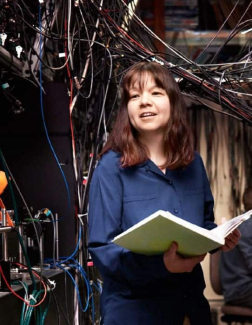To celebrate International Women in Science Day 2024, JILA is honoring the work and legacy of the late Deborah Jin, a pioneer in polar molecular quantum chemistry.
Jin’s groundbreaking work significantly impacted JILA (a joint institute of the National Institute of Standards and Technology and the University of Colorado Boulder) and the wider field of physics, marking her as an inspiring figure for this year’s International Women in Science Day.
Even for those who never had the privilege of meeting Jin in person, her legacy as a pioneer in ultracold physics and her influence as a role model for female physicists have made her a powerful figure at JILA.
JILA postdoctoral researcher Tianrui Xu is one of the individuals whom Jin influenced.
“She [Jin] went to my undergrad institution and talked at a colloquium,” Xu explained. “It was actually the best colloquium I've ever heard before, up to that point. She described things in a way that everyone could understand what she was talking about. I was a third-year undergrad, and it was a positive experience because I always thought that I couldn't understand many things that people said because of the language barrier. But I realized, from her talk, that I should be more confident attending these events since I could easily understand what Jin was saying.”
Others who knew Jin, including NIST and JILA Fellow Ana Maria Rey, also took inspiration from Jin’s effective communication skills.
“Debbie was very good about communicating science with simple terms and pictures,” Rey elaborated. “She originally didn’t like how I tried to communicate my theories using mathematics. She asked me to explain things like she would. I’ve worked to pass these ideas along to my own students, illustrating that difficult concepts can be explained using simple terms.”
A Brief Overview of Jin’s Research
Born in 1968, Jin's career was distinguished by her innovative research in ultracold atomic gases, leading to the creation of a new form of matter, the fermionic condensate, in 2003. This achievement opened new avenues for understanding quantum mechanics and has had profound implications for the study of superconductivity and quantum computing.
Xu was exposed to Jin’s research even before meeting her. During her undergraduate career, her supervisor encouraged her to study Jin’s 2013 paper on dipolar condensed gases.
“My theory paper was heavily inspired by her work,” Xu added.
As a JILA Fellow, Jin was known for her exceptional skill in experimental physics and her ability to devise experiments that led to fundamental discoveries about the nature of matter at temperatures close to absolute zero.
Her work has been recognized with numerous prestigious awards, including the MacArthur Fellowship (also known as the "genius grant") in 2003, the Maria Goeppert-Mayer Award in 2002, the Arther S. Flemming Award in 2003, the Service to America Medal in 2004, Scientific American's “Research Leader of the Year” in 2004, APS’s I.I. Rabi Prize in 2005, the Benjamin Franklin Medal in Physics in 2009, a NIST Gold Medal in 2011, L’Oréal-UNESCO for Women in Science Award in 2013, the Institute of Physics Isaac Newton Medal in 2014, and the Comstock Prize in Physics in 2014, among others achievements.
What makes Jin’s career especially impactful to researchers like Xu is that she didn’t begin her career in polar molecular quantum chemistry but in condensed matter physics.
“This made me realize it's possible to switch fields like this, which is what I did,” added Xu. “She also inspired me to think more creatively about how to apply my condensed matter background, which I’m still working on. I know she was able to apply some of her Ph.D. experiences to her new field very successfully, and I hope to replicate that in my own career. I think it’s just very exciting.”
Unfortunately, Jin passed away from cancer in September of 2016 at the age of 47. Many in the JILA and wider physics community continue to mourn her loss and strive to advance her research further.
For Rey, this means using quantum simulation to try and replicate the superconducting systems Jin was experimenting with to find alternative methods to study unique quantum phenomena.
“The use of quantum simulators removes the complexities of the experiment,” Rey added. “Debbie worked to cool things down to see strong interactions between the atoms, but this added some challenges. With a quantum simulator, we can make things a bit easier.”
Jin's legacy extends beyond her scientific achievements; she was a role model and mentor to many young scientists, especially women, encouraging a more inclusive and diverse scientific community. Her contributions advanced the field of physics and paved the way for more women to pursue careers in science, making her an enduring inspiration on International Women in Science Day and beyond. Jin's dedication to her work and impact on JILA exemplify women's crucial role in advancing scientific knowledge and innovation.
Written by Kenna Hughes-Castleberry, JILA Science Communicator





